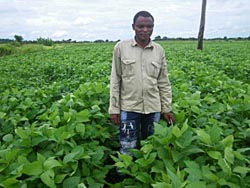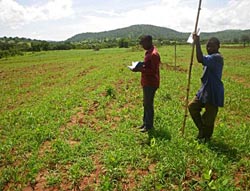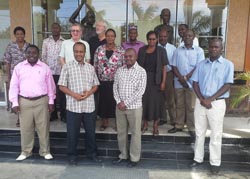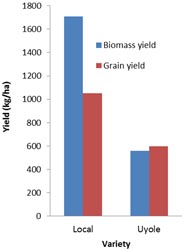The Catholic Relief Services (CRS), through the United States Department of Agriculture (USDA) -funded Soya ni Pesa Project is supporting small holder farmers in Southern highlands (Ruvuma and Njombe regions) of Tanzania to grow soyabean. In this endeavour the project has identified lack of seed and well adapted soyabean varieties to be the major challenge. In the second week of June, CRS Tanzania organized a three-day meeting to analyse the situation and explore options to accelerate the identification and provision of seed of improved varieties to the project area. The meeting was attended by project staff of Soya ni pesa project, N2Africa, IITA, Uyole Agricultural Research Institute (ARI Uyole), Tanzania Official Seed Certification Institute (TOSCI), Namtumbo District Council, Agriculture Seed Agency (ASA), Seed Co and development practitioners from NAFAKA project and - SAO HILL commercial farm.
It was revealed during the meeting that only three soyabean varieties namely Bossier, Uyole 1 and Uyole 2 are released in Tanzania. It was also mentioned that reasonable quantities of seed are available only for Uyole 1, as the multiplication of other varieties is by the lack of pre basic seeds. However, a report of field demonstrations conducted by Soya ni Pesa project in Ruvuma and Njombe regions indicated that Uyole 1 is performing poorly compared the with the local variety. In most sites the local variety had good vigour, smothered weeds and yielded more grains compared to Uyole 1 (see the Figure and the Photos). While farmers preferred the local variety over Uyole 1, its yield indicates that there is still room for improvement through introduction of new superior varieties.
|
Participants of CRS-consultative meeting held in Dar es Salaam to deliberate on ways to improve the availability of soyabean seeds in Tanzania
|
Figure A: Mean biomass and grain yields of a local and Uyole 1 soyabean varieties measured from 18 sites in Ruvuna region |
 |
 |
Figure B: Field appearance of a local (left) and Uyole 1 (right) varieties at flowering stage as observed at Limamu village: The local variety is tall with good canopy closure which minimizes weeds. Uyole 1 is short with poor canopy closure and weed pressure is intense |
An inventory of existing materials in and outside the country led to a long list of soyabean genotypes with better qualities than the local and the currently released varieties. These include those in the pipe line for release by ARI Uyole (WF-L19; Maksoy 2N and a cross of Namsoy 4N and a UG variety); materials from N2Africa-Kenya (Namsoy, TGx1740-2F and TGx1987-64-F) and materials from Seed Co (SC Squire, SC Safari, SC Semeki and SC Spike). Participants agreed to introduce these materials and fast track them through active national institutions including ARI Uyole and ASA with the support from CRS and N2Africa. It was also agreed to provide training on seed quality control and seed basic processing equipment to project partner organizations to support community-based seed bulking. ASA and TOSCI will also develop standards for soyabean seed, based on germination percentage and sanitation, and assist in regular sampling and testing of community-bulked seed. Beside soyabean varieties and seed it was recommended that Soya ni Pesa project and N2Africa design and promote improved soyabean intercropping with special attention to spacing, rotation, and to support the availability of required inputs, particularly blended fertilizers and inoculants. Activities kick off next growing season, which starts early November.
Freddy Baijukya (N2Africa, Kenya), Amsalu Gebreselassie and Lembris Laizer (CRS, Tanzania)


